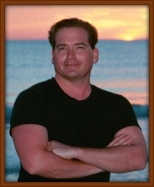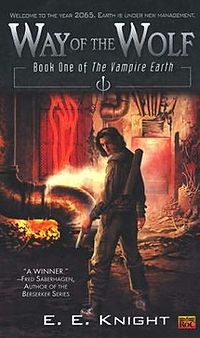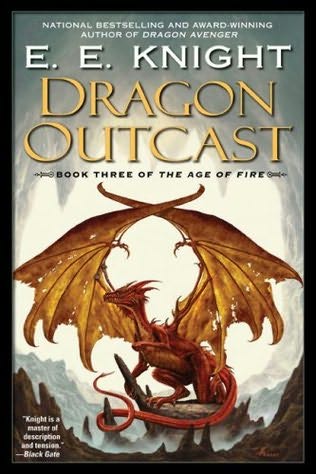E. E. Knight was born in LaCrosse, Wisconsin and grew up near the Twin Cities in Minnesota. He graduated from Northern Illinois University with a double major in History and Political Science, had a number of jobs that had nothing to do with history or political science, and now resides in Chicago. He is the author of the post-apocalyptic Vampire Earth series, the epic fantasy Age of Fire series, and is currently at work on a story that is a “combination of an old Cecil B. DeMille bible epic and Flash Gordon.”
I had a chance recently to sit down with Knight and talk about his work, his road to publication, and much more.
John Ottinger: You have had an interesting road to publication. How did you know you wanted to be a writer and what twists and turns did your career take in getting you there?
E. E. Knight I wrote from a young age, but wanting to be a writer came much later. I think I did my first story, a piece of fanfic, when I was what’s referred to now as a “tween.” Writing through my teen years was just something I liked to do, like building models or drawing or playing games. At that age I wanted to be Jacques Cousteau or James Bond. Since I enjoyed it, I got into journalism in high school. I think my career aspirations at that point leaned toward becoming Steven Spielberg or a Playboy photographer. In college I became a little more realistic. Still wrote, a little journalism, stuff for gaming. Somewhere around that time I thought I’d like to attempt a novel someday, just to see if I could do it. I had a variegated career after college. I did everything from working in a warehouse to managing a McDonald’s, taking pictures at weddings. I decided to see if I could make some money by writing and I sold a little nonfiction, mostly articles on photography to bridal magazines (which paid, at a per word rate, really well). After cashing a few checks, I thought I’d try that novel at last. I didn’t particularly like any of my jobs, but I did like writing, so my dream was to swap out the day job for something I enjoyed.
It took a long time.
My first effort at a novel was a failure. It was the mid-90s at that point, and I was chasing the cyberpunk genre. I didn’t much care for cyberpunk, but it was hot, and that was what editors were buying, or so I thought at that point. The book, called Pipeline, turned out big-D Dreadful. I was depressed—I knew I’d tried to write a novel and I’d produced crap. My aunt, who writes children’s books, looked at my library and asked me what I liked to read. I showed her old pulp classics, horror, hard-bitten noir thrillers, westerns, silver-age SF, and people who are tougher to categorize like Bradbury, Matheson and King. She suggested that I write for myself rather than what I thought editors wanted. Please myself first, and readers with similar tastes might like it as well.
It was like a light went on in my head. I decided to resurrect an old gaming world my players had loved—what eventually became Vampire Earth. I wrote two books in the series and was hard at work on the third but I still couldn’t sell the first, Way of the Wolf.
Wondering what was wrong with it, because I thought it was great, I joined a writers group and posted a few chapters at the old Del Rey Writer’s Workshop. People posted bits of writing, and others commented, kind of an online writers group. I learned about a new site AOL was trying in 2000, a writing forum called iPublish. It was very much like the Del Rey site, except editors perused the writing and stuff that received a positive response and lived up to the promise of the sample chapters would be published as an ebook. Way of the Wolf was picked up by iPublish and an ebook and print-on-demand version appeared in 2001.
There wasn’t much of a market for ebooks then, and iPublish crashed in the dotcom meltdown in 2001. But I had been published, and the book sold well for an iPublish title. I went to the World Fantasy Convention in Montreal with a few print-on-demand copies and I met my agent, John Silbersack, through one of the iPublish editors, Paul Witcover. John liked Wolf, extracted my rights from the iPublish wreckage, and sold it to Roc in what seemed like 15 minutes. They ended up buying three books in that first deal. The rest is a historical footnote.
JO: How do you differentiate your vampires for the Vampire Earth series from other vampire stories?
EEK: A couple of ways. First of all, the traditional vampire is such a powerful creature, I’ve never been able to figure out why they weren’t at the top of the food chain. Most authors have come up with a brilliant solution of one sort or another. I guess I wasn’t smart enough for that, so I was stuck with putting them at the summit.
I also didn’t want the usual charming creature of the night, so I made them unpleasant extraterrestrials. I bifurcated the creature too, with a physically weak alien with many of the mental capabilities attributed to vampires (the Kurians) manipulating their physically powerful avatars (the Reapers) who do the difficult and dangerous job of gathering the energy the Kurians need to extend their lives and ruling mankind.
JO: Would you say that the Vampire Earth series is post-apocalyptic fiction first and vampires second or the other way around?
EEK: I set the story about two generations after the “apocalypse” so there’s not quite so much of the scrounging/survivalist stuff. Society has rebuilt itself, and rather like Winston Smith in 1984 my hero is interested in what life was like before the Kurians came. Even the “vampires” are rather remote, the average person is no more likely to meet a Kurian than I am to be invited into the White House or the Kremlin. It’s about people and a world. I suppose it’s paramilitary dark fantasy adventure with some western and post-apocalyptic flourishes, but that’s a little hard to fit on the spine.
JO: You have written two fairly lengthy series of novels, The Age of Fire epic fantasies and the Vampire Earth series. What do you do to keep your writing fresh while still returning to the same elements time and again?
EEK: With the Vampire Earth books I’ve tried to change the scope and scale of the problems Val deals with. Also, rather than doing the traditional rise of a hero, I’ve knocked him down a couple of times. In Valentine’s Rising he seemed destined for greatness, and that was confirmed in the opening of Exile, but the rug was pulled from beneath his feet and down he went.
I think some fans would like to see more Reaper—and other creature—fighting. But I’ve done that a lot. It gets a little like Superman: “Wow, he’s lifted a bus and saved those people. Can he lift a train? Whoa, he did it! I wonder if he can lift a sinking ferry?” I’m probably doing Superman a disservice, but I never managed to get into him. I’ve tried to balance making each book different enough to keep me interested but still give the readers what they’re looking for. Of course, I’ve never succeeded in making everyone happy—never will, either.
In the Age of Fire books I opened by writing three different novels from the points of view of three different members of the same dragon family. Then with the other three books of the series I reunited them and took it from there, so it’s more like doing a four-book series, as challenges go.
JO: Since you write such lengthy series, do you intentionally include entry points for new readers? If you do, where in your two series might a new author find entry without having to go back and read the prequels?
EEK: A new reader is best off entering at the beginning of any of the three-book cycles. I’ve written Vampire Earth in a series of trilogies with similar titles. So Way of the Wolf, Valentine’s Exile, or Fall With Honor are probably the best entry points.
JO: What themes do you like to explore in your novels?
EEK: Heroism, friendship, love, duty, truth—a lot of the usual subjects, just not as well as Shakespeare. One of the great things about writing is it’s a little bit of a mind meld between author and reader, often people come away with an interpretation or theme that I didn’t put in there, at least consciously. Sometimes they’re wrong—a reader once argued that I’d written a red state vs. blue state series. It’s pretty easy to prove that the first three books were written well before the 2000 election, and a couple of the most powerful Kurian Zones are in what were and are strongly Republican states. Other times I chuckle, as when a reader told me that Val, Ahn-Kha, and Duvalier were Id, Ego, and Superego (not in that order). That reader was pretty much right, I just never thought of it in those terms. Sometimes I just get embarrassed, as when they spot an error or inconsistency.
I almost always figure out what the book is really about in the editorial process. During revision, I see what I’m really talking about and try to figure out how to shape and shade that a little better.
JO: What makes for a good character?
EEK: Good characterization means the person seems real enough to be living in the reader’s head. There are lots of paths to this, but they all come out at that result. You’d either like to meet them in person, or be terrified of meeting them outside of a Hannibal Lecter-type containment apparatus. If you met a character you enjoy, you’d have a pretty good idea of how they’d behave, what they’d talk about, their sense of humor, and you’d probably have a list of questions you’d like to ask. The really great characters have a couple of mysteries about them. I’ve always wondered if Sherlock Holmes ever kissed a woman—I suspect not, though he had to have been a teen at some point—or whether Horatio Hornblower cheated on his wife at the Czar’s palace.
JO: How do you visualize your scenes? Some authors simply see it in their head, some have told me they will get up and act it out, others use action figures or ask an expert martial artist for things like fight scenes. What is it that you do?
EEK: I guess I’ll give the C.S. Forester answer and say that in my head it’s a little like a stage. I have a general idea of the background scenery, but that’s just there to add overall color. What’s important is where the spotlight is shining, how the characters look, who is doing and saying what, who is entering with a new piece of information or leaving, whether this scene is about ethos or pathos or logos, and whether Chekov’s gun on the mantelpiece is likely to be used in the next minute.
JO: What sort of stories do you like to read?
EEK: I like the genres but I don’t read much romance. On the other hand, romance has vigorous tendrils sending up all sorts of delightful shoots in scifi/fantasy these days. I like historical fiction. I don’t do much literary fiction, though I think these days King is considered literary. My favorites are some of the Silver Age SF guys, like Laumer and H. Beam Piper and Zelazny. My friend Howard Andrew Jones (whose great historical-fantasy debut, Desert of Souls (John’s review), just came out) got me into Leigh Brackett and I’ve been reading old sword and planet lately by her and C.L. Moore. I really enjoy a good Western, especially Louis L’Amour.
There are also some exciting new guys coming up, like Taylor Andersen with his Destroyermen books, Aussie Graham Sharp Paul with Helfort, and Larry Correia with the Monster Hunter Nation series.
JO: You have mentioned in another interview that you are a Civil War battlefield visitor. What to you is the draw of such sites and that particular point in history? How has this interest bled into your writing?
EEK: Yes, I’m a bit of a buff. If you’re motoring around Virginia or Tennessee, you wouldn’t imagine bodies were once lying in windrows just behind that McDonalds or whatever. The Earth is indifferent. The kudzu won’t mind if our cars quit running and the theaters empty out, it’ll just give it more places to grow. Only we can hallow ground, and keep it hallow by recognizing, even appreciating, what happened. Warfare is a dreadfully appealing combination of the noble (well, sometimes) and the feral (always), as Robert E. Lee noted, looking out over the killing fields of Fredericksburg.
JO: You have been a major contributor of time and effort on behalf of publications like Black Gate and Rogue Blades Entertainment that produce sword and sorcery style stories. Yet only in short fiction have you written anything that might be categorized as such. What is the appeal of sword and sorcery to you?
EEK: Sword and sorcery was my first self-discovered genre. My father gave me my first SF and had a bunch of westerns, and my mom (an English major) told me which American and world literary writers she liked. At the time, I was playing the “Dungeons and Dragons” boxed game—this was just before the first AD&D hardcovers came out, and in the back of the rules book there was a wonderful bibliography. Howard, Lovecraft, Leiber, Lin Carter, Michael Moorcock…anyway, this was before the internet, so I had to do some legwork—I mean that literally, I was a ninth-grader without a driver’s license—to track it down. My school librarian helped with some, the Minneapolis public library had some Lovecraft, and I was able to find the Conan stories in print (later I was distressed to discover that some of what I thought was the Conan pantheon involved other Howard stories re-written to star Conan) and a friend of my father’s was into Tolkien. A lot of it was unobtainable, at least to a Minnesota teenager with a pocket allowance. Nevertheless, in Sword and Sorcery I’d found a whole world that few of my peers had even heard about, beyond the existence of Conan the Barbarian as a comic book character. Sword and sorcery was the first genre in what’s now my personal library.
I think the appeal was natural to an adolescent. Brawny warriors, lost cities, beautiful princesses, pirate queens and dancing girls, arcane magic reaching out of a vanished past, beasts, troglodyte races…when it’s well done, sword and sorcery is hard to beat for breathless “excitement and adventure,” as Vincent D’Onofrio’s R.E. Howard hollered in The Whole Wide World (John’s review).
JO: As anyone who reads your blog knows, you are as much a fan as a writer. What have been some of your favorite author encounters over the years?
EEK: Oh, I like getting little stories about authors straight, like just how Keith Laumer liked Jame Retief pronounced or how Alan Dean Foster ended up with the mysterious Dr. Dee chair. If you ever get a chance to sit down with Joe and Gay Haldeman, do it. You’ll hear some great stories. Most writers have an appealing little detail or two associated with them. It’s fun to watch women swoon around Neil Gaiman, or wipe tears of laughter from your eyes during a Terry Pratchett keynote. I’ve learned that George R.R. Martin doesn’t give a flip about how you pronounce the names of his characters. As long as the reader knows who they are, he doesn’t care what you call them in your head. Good policy.
JO: What projects are you currently working on?
EEK: I’m hoping to continue the Vampire Earth series. I’d also like to do something big, kind of a combination of an old Cecil B. DeMille bible epic and Flash Gordon.
JO: Where can we find you online?
EEK: Several places, but the nexus is eeknight.com. From there you can find Facebook, my blog, all that stuff. I try to be accessible.
JO: Thanks for your time!
John Ottinger is a middle school educator, writer, and fantasy fanboy. You can find his musings and reviews at Grasping for the Wind.












